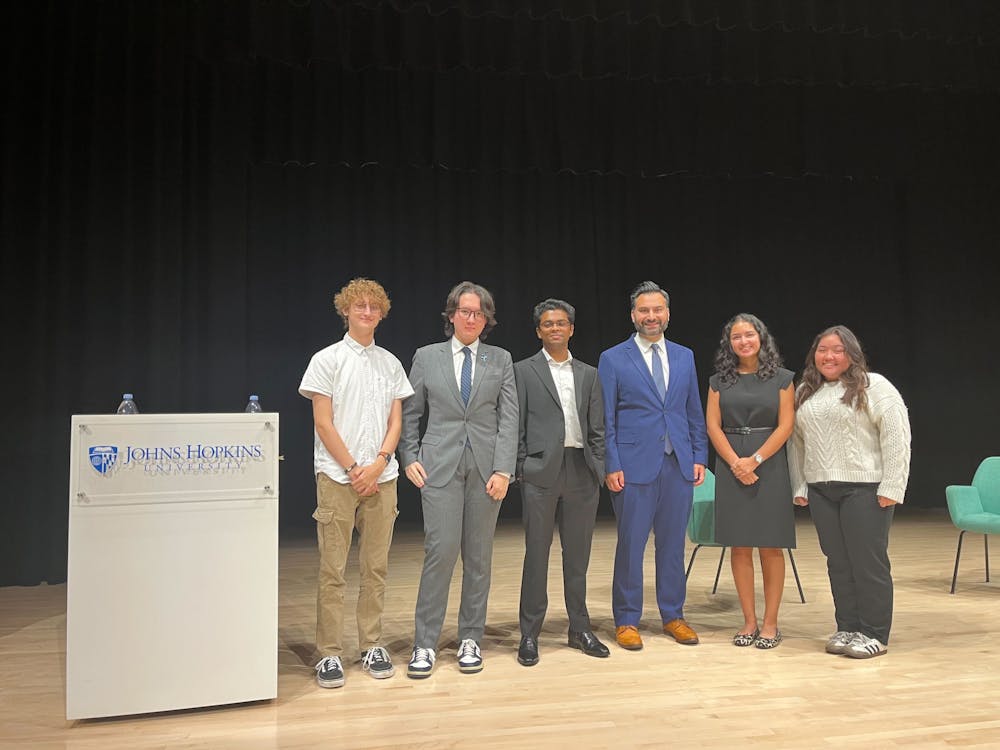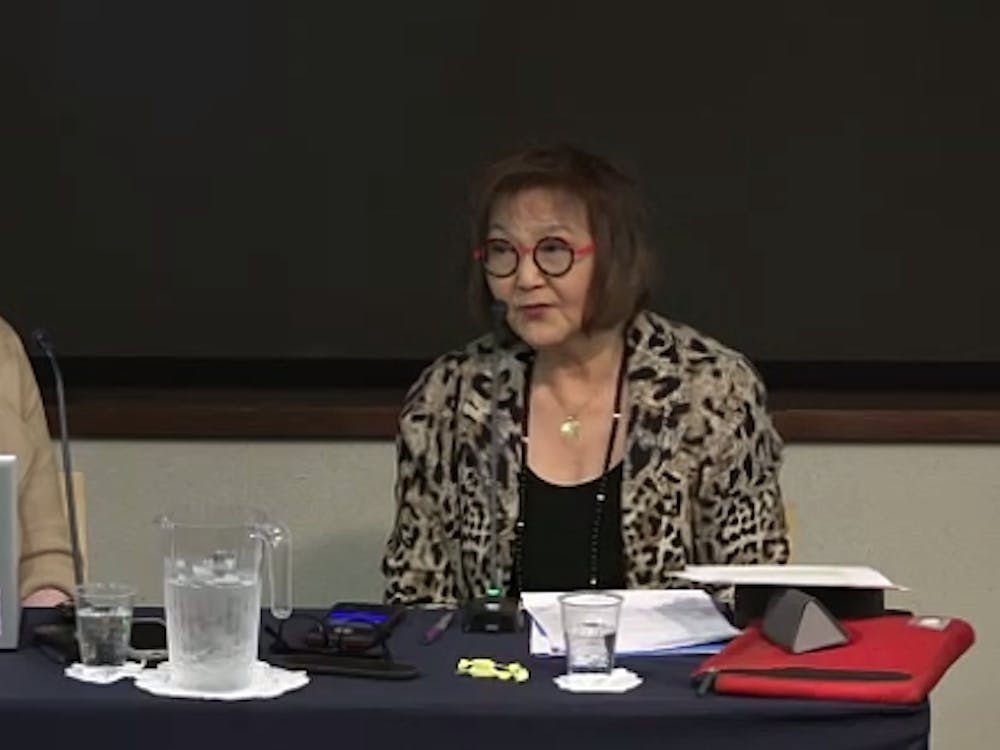On Wednesday, Oct. 1 the Hopkins Lecture Series hosted a talk featuring former White House National Climate Advisor Ali Zaidi. Zaidi had served as an advisor under both President Barack Obama and President Joe Biden during their administrations and has been a leading figure in shaping federal climate policy.
Zaidi’s visit marked one of the first major lectures of the fall semester, engaging with student interests in public policy and environmental science. His talk focused on the intersection between climate action and government and was oriented around demystifying the process of policymaking.
In an interview with The News-Letter, Chair of the Lecture Series Sofia Gosain, described how she organized the event with Zaidi and explained why the group chose him to talk.
“We like to create events that we think [students and faculty] will learn from, grow from and also find entertainment,” she said. “With this event specifically, we think that we’re really at a crossroads with the climate crisis, and so we thought it would be very interesting to hear from someone who was national climate advisor to President Biden and worked in the Obama White House for eight years. [...] Mr. Zaidi is someone who really stood out to us.”
The discussion was moderated by Dr. Bentley Allan, associate professor of political science and founder and co-director of the Net Zero Industrial Policy Lab. He opened the event with a question centered around how Zaidi bridged the climate politics era of both the Obama and Biden administrations. Zaidi answered that the shift came from an attempt at advancement — the distinction between the two periods rests in the transition from vision to execution. Additionally, Zaidi explained that when someone thinks of the duration of a technological trend from the Obama administration to the Biden administration, they are able to see that prices dropped drastically.
“For me, the shift from eight years of Obama to what we tried to advance in New York was seismic, in some ways; one could not have happened without the other,” he said. “We went from a concept, a mental model for how we were going to solve this global challenge, to the roll-up-your-sleeves hard work of implementing that.”
The conversation then shifted to specifics, with Allan asking Zaidi to unpack how the Inflation Reduction Act (IRA) was the vehicle for the thesis of climate change policy under the Biden administration.
Zaidi explained that the act was impactful due to its sheer ambition in its willingness to redefine the scale at which the federal government could intervene in the climate crisis. He emphasized that the Inflation Reduction Act represented a decisive shift from incremental change to transformative investment.
“Thing number one that was sort of surprising about the Inflation Reduction Act was that we actually decided to go big,” he said. “We frame [the opportunity of the act] as not just an opportunity to swing at the climate problem, but this moon shot to bring opportunity back.”
Many participants found Zaidi’s perspective refreshing in its balance between realism and optimism. For example, junior Kylani Edge elaborated on how Zaidi’s remarks contrasted with the typical idea that surrounds climate change in an interview with The News-Letter. In this talk, she noted, Zaidi’s ability to frame climate work in a more encouraging light stood out to her.
“I think my main takeaway is that when we talk about climate policy, it’s very often like there’s an impending doom, in a sense. It’s just a pessimistic field to work in,” she explained. “So, the main thing that was surprising to me was that this talk was very optimistic. It’s kind of just like, do what you can with what you can have.”
Moving to the idea of climate as a scientific problem, Zaidi was asked how he managed to craft climate into an everyday problem rather than a purely scientific one. The question invited him to reflect on how policy and communication would be able to make climate change feel immediate. To answer, Zaidi emphasized the importance of grounding policy in experience.
“One of the things I’ve spent a little bit of time doing, in the last few months, is thinking through: what is theory? [...] If I were to boil it all down, [...] it is that we try to bring the benefits of taking action closer to people, both geographically and temporally. So climate change is something that operates on a decadal scale, right? And it’s a global problem,” he answered.
Building on that idea, Zaidi went on to illustrate the difference between distant, conceptual ideals and practical, tangible ones. He argued that this distinction often determines the success or failure of climate policy and that global/long-term impacts of climate change may feel abstract to most people in their daily lives.
To clarify, Zaidi gave an example: By asking someone to put a solar panel on their roof because the “equatorial temperatures” will improve, the likelihood that they will respond positively is less likely than if he were to explain that the solar panel would help decrease energy bills.
Closing the discussion, Allan asked what the next steps would be for climate politics in the U.S. He questioned whether Zaidi thinks that the government should focus on a broader climate project’s vision or on getting the details correct. Zaidi emphasized the importance of flexibility and grace within the political process, arguing that progress in climate policy depends on persistence.
“We got to stick to what we do know works, and that is a delivery of benefits to people closer to where they live and closer to the time scale that they care about,“ he explained. “So let’s focus on blue collar jobs. Let’s focus on improving public health outcomes [...] I think that’s still a winning strategy.”
The event ended with a 20-minute open Q&A from the audience. Questions ranged from the philosophies of climate policymaking to the practical challenges of balancing idealism with feasibility. These exchanges created a more conversational atmosphere, allowing Zaidi and students to speak candidly and engage with one another.
When asked by a representative of The News-Letter how he differentiates between politics, belief and fact — and how that difference manifests itself in policy creation — Zaidi reframed the question. Rather than illustrating a strict boundary on the three points, he underscored the complexity of translating diverse perspectives into actionable policy.
“In an ideal world, you’re sitting at the White House, and you can have a conversation with 200-some-odd-million people every single day — and synthesize it, figure out where to go and what’s going to be most responsive,” he answered. “The reality is, you can’t really do that, so what you do is rely on statistical data [and] scientific analyses to help you spot trends and figure out the strands and stresses and integrate that with robust discourse and dialogue with the American people to shape a policy agenda that’s going to be resonant.”
In another question, one participant asked about effective climate policy and the goal for a net-zero future amid rising costs for middle-class and working-class families. In response, Zaidi described his perspective on the intersection between sustainability and social equity, framing the climate crisis as both an environmental concern and also as an issue of global development and human dignity.
“Our ability to flourish globally depends on our ability to have a ladder into the middle class for individuals,” he explained. “The reason I reject the deep growth approach is because there are hundreds of millions, if not several billion, people living in poverty without access to water that’s clean, without access to the healthcare system that works, without access to affordable energy [...] and I don't understand how we have the moral basis, or certainly the political economy, to ask those billions of people to suck it up.”
Senior and environmental science major Alex Watson described the impact of the event in an interview with The News-Letter. She explained how she entered the event with an open mind, ready to learn about the shifting political climate that has to do with climate policy.
“[Zaidi] is obviously someone very high up in the administration, and [he showed] what it looks like to navigate that sphere,” she said. “I think he talked a lot about working within whatever existing political climate is currently in effect and not doing a lot of things that you can’t control.”
Watson also reflected on the opportunity to ask Zaidi a question and the significance of being able to engage with a policymaker. For Watson, the exchange was valuable as it offered a chance to connect with someone in the field.
“I just wanted to make myself ask a question because that’s tough for me to do sometimes,” she said. “I think the main takeaway that I just got from his talk was that you can’t have an ‘all or nothing’ approach, you have to accommodate a lot of different approaches.”





